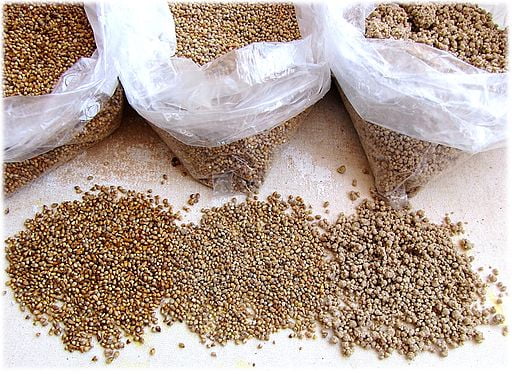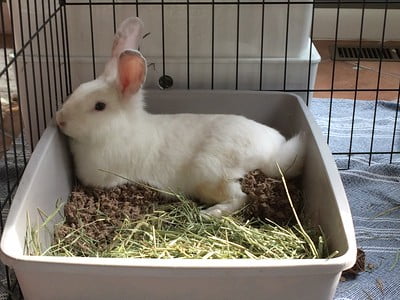Last Updated on March 7, 2023 by Marjon Ramos
It’s fine if your rabbit eats small amounts of chinchilla food, but make sure that you don’t make it a habit.
Rabbits and chinchillas have different nutritional needs.
As an example, most chinchilla foods have the following nutritional percentage: 16–20% protein, 2.5–5% fat, and 15–23% fiber, while most rabbit foods have 18–22% fiber, <3% fat, <1% calcium, and 14–18% protein. As you can see, chinchilla food contains too much fat.
Now that I’ve given you the gist of the article, read on as I explain in more detail why rabbits can’t eat chinchilla food long-term:
Table of Contents
Risk of feeding chinchilla food to rabbits.
Because rabbits and chinchillas have different nutritional needs, feeding your rabbits chinchilla foods has risks if fed long term.
Here are some of the risks associated with feeding your rabbits large amounts of chinchilla food:
Fatty liver disease
Most chinchilla foods are high in fat, feeding your rabbits chinchilla food long-term could lead to hepatic lipidosis, or fatty liver disease.
A rabbit’s diet should consist of less than 3% fat. Chinchilla food, on the other hand, contains 2.5–5% fat.
Here are the signs that your rabbit might be suffering from fatty liver disease caused by excess fat:
- Loss of appetite (anorexia) – may be sudden or gradual.
- Weight loss
- Decline in number and size of droppings (feces)
- Dehydration
- Depression and lethargy
Gastrointestinal Stasis
Gastrointestinal stasis is also possible when a rabbit is fed large amounts of chinchilla food, which is high in fat.
GI stasis mainly happens when a rabbit is fed a low-fiber diet or when fed the wrong diet.
GI stasis happens when the balance of bacteria in your rabbit’s gut is disrupted.
This disruption would cause painful gas that would eventually lead to organ failure and death if not treated immediately.
The signs of GI stasis are:
- Depressed
- Hunched posture
- Bruxism
- Decreased appetite/anorexia
If you notice any of these signs, immediately bring your rabbit to a veterinarian.
Obesity
Overfeeding chinchilla food to older rabbits, whose metabolism is slower, could lead to obesity due to the high-fat content of chinchilla food.
Obesity could also lead to uneaten cecotropes, or “poopy bottom,” because obese rabbits wouldn’t be able to reach their cecotropes to eat them.
Diarrhea
Diarrhea in rabbits is often caused by the wrong diet or when their diet is changed too fast.
Feeding your rabbit large amounts of chinchilla food would check those two boxes I mentioned.
FAQ (Frequently Asked Questions)
Should you panic if your rabbit ate a little bit of chinchilla food?
While it’s true that rabbits should not eat chinchilla food, taking a small bite of chinchilla food is not a problem.
Rabbit food and chinchilla food are actually quite similar; it’s just that chinchilla food contains a little bit more fat.
As long as you’re not feeding your rabbit a lot of chinchilla food intentionally, then you should be fine.
Observe your rabbit for any behavioral changes or any changes in their poop.
What to do if your rabbit ate chinchilla food?
Observe their behavior, poop, and urine for any changes.
If you did notice something after your rabbit accidentally ate chinchilla food, call a veterinarian for proper advice.
Conclusion
Chinchilla food should never be fed to rabbits intentionally because rabbits’ nutritional needs are different from chinchillas’.
Rabbit food needs to have 18-22% fiber, <3% fat, <1% calcium, and 14–18% protein.
Most chinchilla foods have 16–20% protein, 2.5–5% fat, and 15–23% fiber.
As you can see, chinchilla food contains too much fat.
Feeding your rabbits chinchilla food long-term could lead to all kinds of digestive problems like GI stasis, diarrhea, and fatty liver disease.
If you have noticed some behavioral, urine, and poop changes, call a veterinarian for proper advice.
Image credit – Attribution: Photo by kiliweb per Open Pet Food Facts




